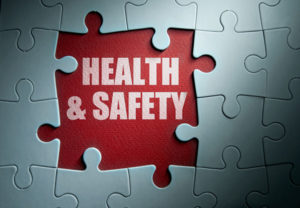ILSI Federation Newsletter: Risk Analysis
January 2023
 Our newsletter provides an overview of upcoming, current and recent ILSI Federation activities pertaining to Risk Analysis, an internationally accepted framework encompassing risk assessment, risk management and risk communication activities, and originally fostered by the World Health Organization to ensure that foods are safe.
Our newsletter provides an overview of upcoming, current and recent ILSI Federation activities pertaining to Risk Analysis, an internationally accepted framework encompassing risk assessment, risk management and risk communication activities, and originally fostered by the World Health Organization to ensure that foods are safe.
Presented by: Hannia Leon (ILSI Mesoamerica) and Helene Tournu (ILSI Global).
ILSI Federation Activities
ILSI works with researchers from the public and private sectors, as well as academia, on translational and pre-competitive science and health issues to address common interest or concern. Public-private collaboration – where all interests, conflicts and biases are declared, and all funding is acknowledged – can improve the science used to promote the health and safety of the public and the environment. Together with its hundreds of academic institutions from around the world, public sector agencies, more than 300 member companies and civil society organizations, the ILSI Federation develops project proposals that address important public health issues with the highest standards of scientific integrity.
Upcoming and Ongoing ILSI Activities
Dealing with Uncertainty in Hazard Assessment: a Comparison of TTC versus Chemical-Specific Approaches
This webinar by ILSI Europe, expected in Q4 of 2023, will provide a review of the results of the expert group mandated by the Threshold of Toxicology Concern task force. Contact Isabelle at iguelinckx@ilsieurope.be for more informaton.
Assessment of Mixtures: Opportunities with New Technologies
This new research proposal, driven by Wageningen University and ILSI Europe, aims to create a software tool through which unknown compounds can be detected by means of high-resolution LC-MS or GCMS, permitting tentative identification. Express your interest in this project to Konrad Korzeniowski at kkorzeniowski@ilsieurope.be.
Monograph on Nutrient, Vitamins, Minerals and Bioactive Compounds Risk Assessment
This study, coordinated by ILSI India, sought to incorporate factors such as bodyweight, uncertainties and others to the Tolerable Upper Limit (TUL) nutrient index. Guidelines developed by the Codex Alimentarius Commission have been used worldwide, and different countries and regions have defined their own TUL for various nutrients. The monograph compiles information on five main drivers of variation between datasets:
- The terminologies used to express the safe limits for nutrients.
- The basis for generating safe limits for nutrients.
- The application of risk analysis frameworks for some bioactive compounds.
- The exposure assessment and risk characterization-resulting data in India compared to other countries.
- The identification of gaps for further improvement in nutrient risk assessment.
The release date for the monograph is coming soon. Contact Rekha at rsinha@ilsi-india.org for more information.
Bioactives, Functional Foods and Nutritional Supplements
 Few evidence-based recommendations exist for the consumption of bioactives, the amounts of ingredients in so-called "functional foods," or the foods themselves that contain some of these bioactives and dietary supplements. The ILSI U.S. and Canada Research Program is getting ready to launch this new project and proposes to work on three main objectives:
Few evidence-based recommendations exist for the consumption of bioactives, the amounts of ingredients in so-called "functional foods," or the foods themselves that contain some of these bioactives and dietary supplements. The ILSI U.S. and Canada Research Program is getting ready to launch this new project and proposes to work on three main objectives:
- Apply methods for assessing the bioavailability, efficacy and safety of bioactives in food.
- Develop and apply methods for assessing the bioavailability, efficacy and safety of bioactives in dietary supplements.
- Develop guidelines for specific bioactives in food and dietary supplements (e.g., coffee, anthocyanins and proanthocyanins, lutein, etc.)
Please contact Michael at mhattaway@ilsi.org for more information.
Risk-Benefit Assessment of Foods: Approaches to Facilitate Application
Ongoing - Classical risk assessment does not reconcile the benefit to the health of the food against the potential effects of the contaminants or the impact of mitigation measures that may be applied to reduce contaminants. As such, methods for the comparison between benefits and risks have been developed; however, application of the methods is limited. An expert group at ILSI Europe explores the reasons for limited application and seeks practical solutions to increase utility. Contact Konrad at kkorzeniowski@ilsieurope.be for more information.
Risk Assessment of Cell-Based Cultivated Food Products
 This is a new activity proposed by the ILSI U.S. and Canada Research Program, which will dive into the research gaps associated with the safety of these novel foods. Helene is your point of contact for this activity (htournu@ilsi.org).
This is a new activity proposed by the ILSI U.S. and Canada Research Program, which will dive into the research gaps associated with the safety of these novel foods. Helene is your point of contact for this activity (htournu@ilsi.org).
"Antimicrobial Interventions in Meat Products"
Professor Byron Chaves Elizondo, from the University of Nebraska (USA) will present his latest work on risk assessment and procedures to decrease the presence of microbes in raw meat products. This webinar will be hosted by ILSI Mesoamerica, in partnership with the University of Costa Rica and CITA (Centro Nacional de Ciencia y Technologia de Alimentos). It is a virtual event (in Spanish) that will be held on February 7th. Register here and contact Hannia at executivedirector@ilsimesoamerica.org for more information.
Capacity Building on Food Safety Risk Analysis for Risk Manager and Risk Assessment of Microbiological Hazards
Ongoing - The ASEAN Health Cluster 4 and ASEAN Risk Assessment Centre for Food Safety have requested the ILSI Southeast Asia Region to support this program. It is the first Microbiological Risk Assessment (MRA) Capacity Building Program in the region and supports both risk managers (RMs) and risk assessors (RAs). The objectives of this program are to enhance the MRA knowledge and communication among RMs and RAs. The RAs will apply this knowledge in their work on MRA in the region. This project will take 2-3 years. Interested? Reach out to Pauline Chan at paulinechan@ilsisea.org.sg.
Prioritization of Natural Toxins for Risk Management Action based on both Public Health Risk and Mitigation Efficacy
An expert group on the prioritization of natural toxins for risk management action began their work at the end of 2022. This ILSI Europe activity will establish a framework for the prioritization of natural toxins in foods while following a risk-based approach. Contact Konrad at kkorzeniowski@ilsieurope.be for more information.
Recent ILSI Events and Publications
"The Role of Endogenous versus Exogenous Sources in the Exposome of Putative Genotoxins and Consequences for Risk Assessment"
ILSI Europe and its Food Contaminants Task Force present an overview of the current knowledge on the contribution of endogenous exposure to the overall exposure to putative genotoxic food contaminants, namely ethanol, acetaldehyde, formaldehyde, acrylamide, acrolein, α,β-unsaturated alkenals, glycation compounds, N-nitroso compounds, ethylene oxide, furans, 2- and 3-MCPD, and glycidyl esters. This peer-reviewed publication can be found here.
Mineral Oil Risk Assessment: Knowledge Gaps and Roadmap
This ILSI Europe activity resulted in a recommendation document that determined potential best practices to align methods available for untargeted screening and future testing. The consensus is that the lack of standardized, validated analytical methods able to assure good inter-laboratory reproducibility is the main gap underlining most of the existing difficulties to understand mineral oil hydrocarbons. Access the full text here.
Science and Risk Analysis for New Genetically Modified Products: Challenges and Opportunities for Developing Countries
ILSI Brazil hosted this webinar, originally drafted as a parallel session for the ISBR Conference, to highlight the role of innovative science in developing countries in the process and data required for implementation of new technologies.
Environment Risk Assessment (ERA)
ILSI Japan published four ERA reports (in Japanese) in 2022, which describe recent trends on the microbiome and updated rDNA technology in plants that are being introduced.
E-learning course: Introduction and application of the regulation of additives "RTCA 67.04.54:18 Food and Processed Beverages"
ILSI Mesoamerica, with the support of the National Center of Food Technology UCR, developed a course for the proper understanding and application of this Central American norm. More information can be found here.
Safety Evaluation of Highly Purified Food Additives and Foods Using Recombinant Microorganisms
This workshop, which was organized by ILSI Japan, provided an introduction to the overall safety evaluation system for food and food additives that use genetically modified microorganisms for manufacturing. Participants from the Government (MHLW, CAO), academia (Chiba University, Meiji University), and industry mutually shared the situation and issues toward a more scientific, safer and speedy review. Please reach out to Nobu Tsujimoto at ntsujimoto@ilsijapan.org for more information.
Food Classification and Description System within a Consumption Database in Taiwan
Harmonization of national consumption data is an important but challenging project. To achieve this ambitious goal, a team at the National Health Research Institutes works to develop and maintain the comprehensiveness of the National Food Consumption Database in Taiwan (NFCDT). Within that framework, ILSI Taiwan organized an Expert Meeting to discuss what a harmonized, food description and classification system that captures all the useful details of food groups in exposure assessments would look like. The conclusion of the meeting was to add the suitable food descriptors for Taiwan and to provide summary statistics for the National Food Consumption Database of Taiwan. More information can be found here (in Chinese).
From Around the World
International Organizations
Codex Alimentarius Commission
The Codex Alimentarius Commission (Food and Agriculture Organization of the United Nations) held its 45th session in November 2022, and the updates made can be found here.
Regional Organizations
Asia
ASIATOX - The 10th International Congress of Asian Society of Toxicology in Taipei, Taiwan (July 17-20, 2023). ILSI Taiwan will lead the session on "Food Safety and Functionality" at the congress.
Europe
EUROTOX - The 57th Congress of the European Toxicologists and European Societies of Toxicology, Ljubljana, Slovenia (September 10-13, 2023).
U.S. and Canada
Society of Toxicology 62nd Annual Meeting and ToxExpo, Nashville, USA (March 19-23, 2023), with Namandjé N. Bumpus, PhD, Chief Scientist for the U.S. Food and Drug Administration, delivering the opening plenary session on single cell proteomics and its use in understanding xenobiotic-induced toxicity mechanisms.
International Society for Biosafety Research (ISBR) Symposium, St. Louis, USA (30 April – 4 May 2023) with risk analysis for persistent engineered genetic traits and sustainable biotechnologies for a changing world as two main themes this year.
